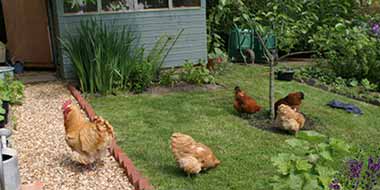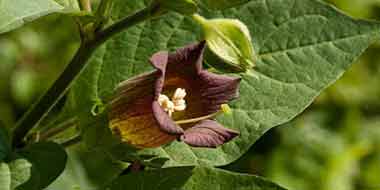
Chickens &
Gardening
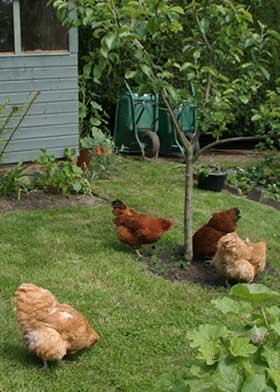
Home-produced eggs are a benefit we all think of when keeping chickens; however, if you have some space for composting chicken manure, you can also produce a Nitrogen-rich chicken manure fertiliser. A complete fertiliser and an excellent source of organic matter, composted chicken manure provides you with a valuable commodity for your garden, containing all the significant nutrients and minor elements that plants require.
Clever hens. Chicken manure as well as eggs!
Composition of chicken manure
One of the best farmyard manures
Up to 85% of raw chicken manure is water. What is left is mostly undigested feed, digestive juices and bacteria from the gastrointestinal tract. There are minerals in poultry manure that come from the metabolic processes used during digestion.
Chicken manure is one of the best farmyard manures. The fertiliser Nitrogen (N), Phosphate (P) and Potash (K) values vary with the nutritional intake of your birds. It also varies, according to the age of the manure itself and if mixed with bedding.
Typical amounts of NPK are 1.8, 1.4 and 0.8 for manure composted with bedding.
It is a complete fertiliser because it contains all of the major nutrients and the minor elements that plants require.
As well as being high in Nitrogen, composted chicken manure and bedding is an excellent source of organic matter which has several advantages over synthetic fertilisers. Organic matter improves soil structure which provides aeration for good plant growth and increases the water-holding capacity of the soil. It is valuable for breaking down heavy clay soils and increases a soil’s ability to hold nutrients.
Nutrients release more slowly from organic fertilisers which allow plants to take them up as they become available. Inorganic fertilisers that aren’t taken up by plants immediately tend to leach away from the soil into waters, causing pollution.
No. Adding fresh chicken manure to your garden will burn your plants. Composted chicken manure has dried out, releasing ammonia and will not harm your plants. It is a complete fertiliser, is rich in Nitrogen and will add organic matter to your soil.
Commercially, excess heat from the top of indoor egg-laying or chicken rearing units is collected and blown over manure on perforated conveyor belts. It is an energy-efficient process using the hot air that is already there. Dried chicken manure is stored and sold by the tonne as a fertiliser to farmers. For gardeners, it is turned into pellets and sold in small tubs in garden centres.
For the gardener with a few chickens, you can use droppings boards under perches to collect manure. It is not cost-effective to blow hot air over the manure so spread it out to dry during warm, sunny weather on wooden boards.
A far better way to deal with chicken manure is to add it to the compost heap all year round, including the bedding (usually wood shavings).
Compost Bin
Buy one or build one, it doesn't need to be posh!
You will need a compost bin. It should be at least 1m cubed, ideally a little bigger. You can use almost anything strong enough to hold the contents together; it doesn’t need to be posh.
The classic allotment compost bin uses wooden pallets. I have made a few cheap compost bins from leftover fencing materials.
Put four posts in the ground with strips of leftover chicken wire to three sides. I screwed wood planks (fencing boards in my case) to the fourth side to hold the contents. Add more boards as it fills up and unscrew them when it’s ready to be dug out.
If possible, use at least a two-bin system. Fill one bin (this will be in the hot compost phase), and leave the second to cure.
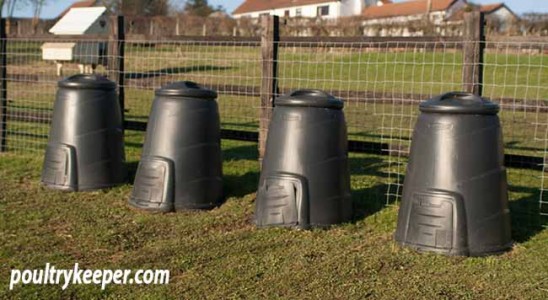 Black plastic compost bins are small and heat well, composting chicken manure quickly if placed in a sunny, south-facing location.
Black plastic compost bins are small and heat well, composting chicken manure quickly if placed in a sunny, south-facing location.
There is an opening at the base, but it’s just as easy to tip them over, leaving a heap of compost on the floor.
I would always recommend these bins if you are short on space. If you choose a type of bedding material that rots down quickly (wood shavings take quite a long time), you can have composted chicken manure in as little as three months.
You may also need a place to store carbon-rich materials. I use a builders ‘tonne bag’ that once delivered sand. You’ll need to keep this material dry, so leftover roofing material or a tarpaulin with a couple of weights on top is ideal.
How to compost chicken manure
Or for gardeners, making "Black Gold"!
Hot composting requires a few things. Bring these together, and the magic starts to happen:
- Carbon (often called browns) – this is the bedding material from your chicken house.
- Nitrogen (often called greens) – this is your chicken manure.
- Moisture (water) – not too much, just enough to provide the right consistency (see my tip below).
- Oxygen – found in the air around us.
- Warmth – compost will slow down then stop when the temperature falls in the autumn.
Mix bedding, manure and moisture
Hot composting will destroy a lot of the pathogens found when composting chicken manure. It takes place when you mix the correct ratio of bedding material (Carbon) and manure (Nitrogen) with sufficient moisture.
Providing the daytime temperature is warm enough then the compost should heat up quite quickly to around 50 to 60°C It should continue to hold this temperature for 2-3 days.
Balancing Carbon and Nitrogen
Gardening books will tell you that the perfect balance to start a hot compost heap is “one part brown (Carbon) to two parts green (Nitrogen)”. Chicken manure contains a lot of Nitrogen compared to garden greens, so I find roughly two parts bedding to one part manure works equally as well for me to get the compost heating up.
I clean my chicken houses out roughly weekly, and during that time, I would say the mixture is closer to three parts bedding to one part manure. This is where the droppings boards come in useful.
I will add half of the bedding material to the compost pile and mix this in with the manure from the droppings boards. The rest of the bedding goes in the ‘browns bag’ (an old builder’s tonne bag), and when I get some grass cuttings from the garden, these are mixed in and added to the compost.
Tip: The right amount of moisture
To test compost for the right consistency, pick up a handful and squeeze it. If there is sufficient moisture content when you open your hand, it will crumble, and some will stick slightly. If it is too wet, it will form a ball and not break apart. If it is too dry, it won't stay on your hand.
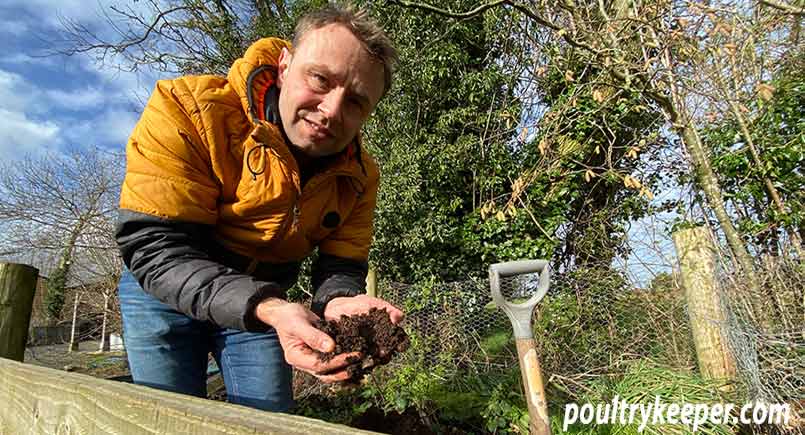
Mix again and repeat
Once your compost has heated, after three days, it will start to cool again. Move the centre out to the sides and pull the sides into the centre to repeat the heating process.
After a week, you will be adding more chicken manure and bedding. Continue to move the centre out every three days until the bin is full, and all of your fresh material has heated.
The curing period
The heap now needs to rest to cure for at least a couple of months. When it is ready, there should be no unpleasant smells; it should be dark and rich and have the consistency of good soil.
When it is ready, you can use it in your garden. I dig most of mine into the vegetable garden in late autumn, but it can be applied to the surface of the soil as well and used as a mulch.
Problems composting chicken manure
If at first, you don't succeed...
Composting chicken manure is not tricky if you get the balance of ingredients right.
If it’s not heating up, take another look at the mixture and make some adjustments. I often have to add a little more moisture, or chicken manure to get it heating because there are always too many pine wood shavings in the bedding I remove from my poultry houses.
If you’ve added too much water, you can easily add some more dry bedding.
If you find uncomposted patches of pine wood shavings, you will need to turn and mix it more thoroughly.
Finally, remember raw chicken manure can contain bacteria that can make you ill. Remember to wear gloves when handling manure. Only spread well-composted manure onto vegetable gardens well in advance of growing your produce.


